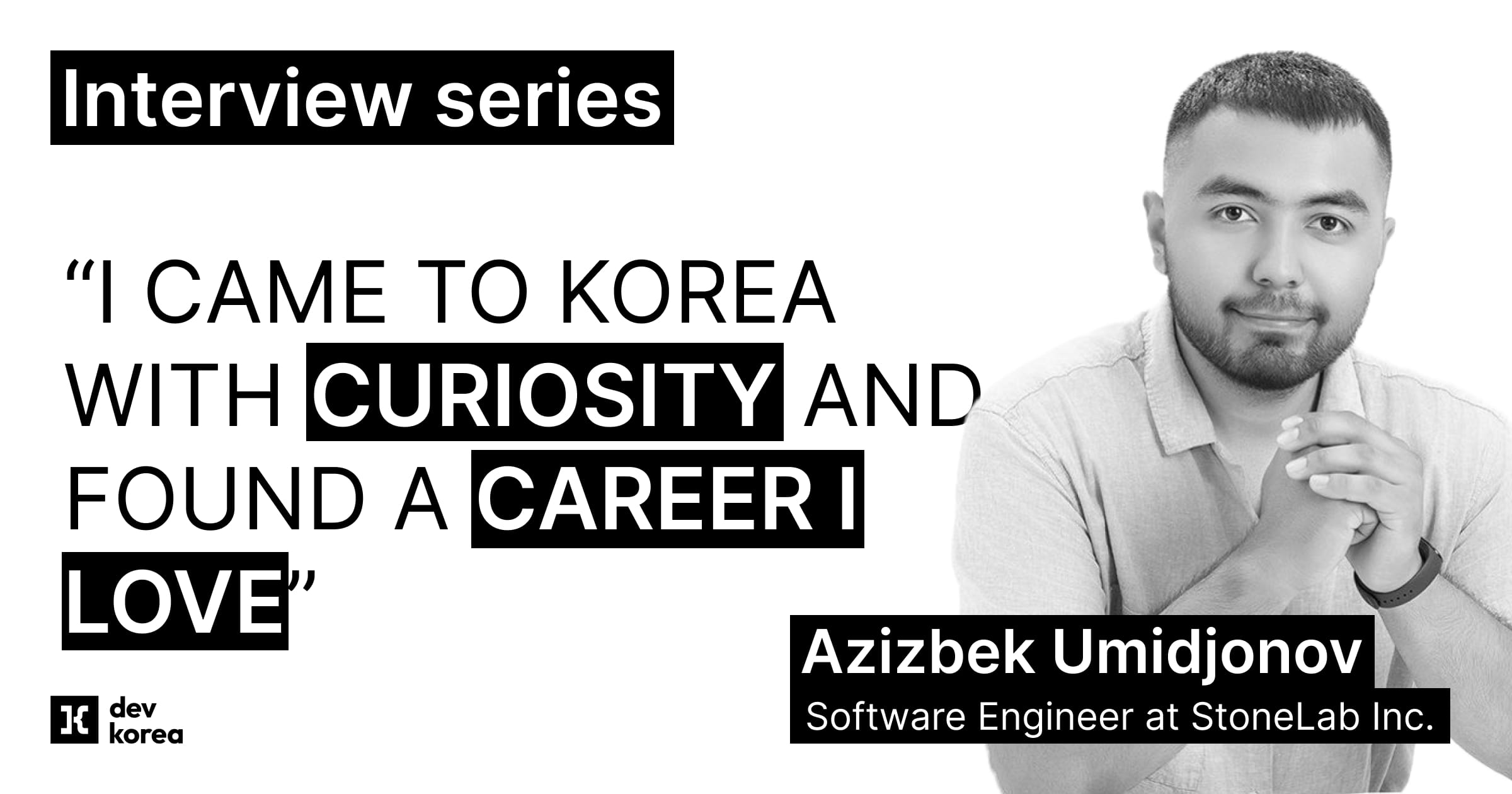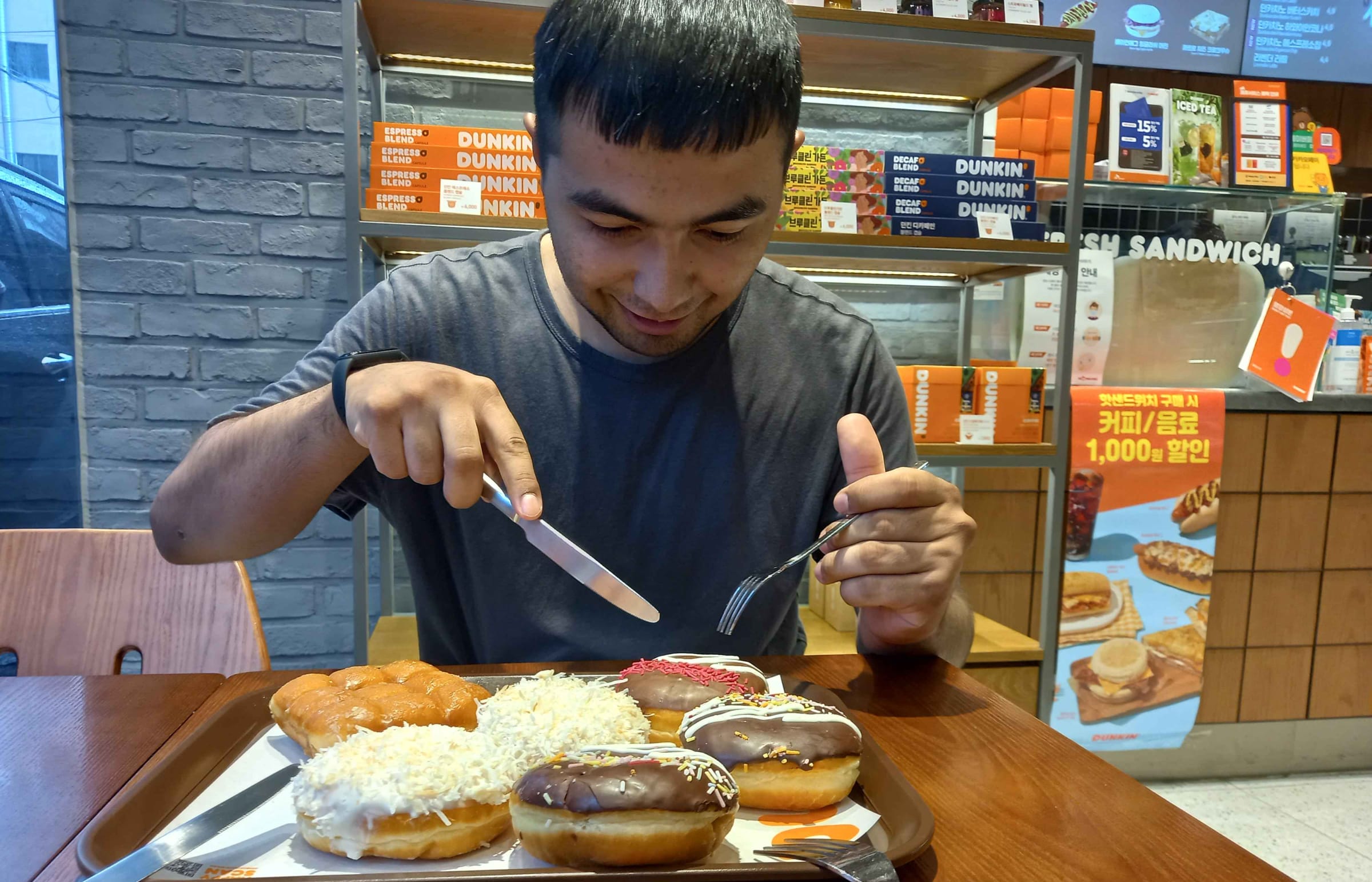
“I didn’t even know Samsung was Korean”: How curiosity led Azizbek to a new life in tech
Meet Azizbek, an Uzbek software engineer at StoneLab Inc. in Seoul. We sat down with him to learn about his journey from Uzbekistan to Korea, what it's like working in tech here, and why he believes more global talent should consider a tech career in Korea.
Profile snapshot
- Name: Azizbek Umidjonov (or just Azi)
- Nationality: Uzbek
- Current role & company: Software Engineer at StoneLab Inc.
- Years in Korea: 5 years
- Visa status: D2 -> E7
- Languages spoken: English, Russian, Uzbek, Tajik
- Previous countries worked in (if any): Uzbekistan
Background & career
Q. Can you briefly introduce yourself and your current role?
My name is Azizbek Umidjonov. I’ve been working at StoneLab since 2022, starting as a part-time software engineer while completing my Computer Science degree at UNIST. After graduating in 2024, I moved into a full-time role. My current work mainly focuses on Android and frontend development, as well as integrating AI technologies into applications to improve user experience and functionality.
Q. What was your career path before moving to Korea?
Before coming to Korea, I received the UNIST Dream Scholarship, which allowed me to pursue my studies here. During my time at university, I interned at two early-stage Korean startups, where I gained hands-on experience in software development. The second company later offered me a full-time position after recognizing my contributions and potential.
Q. What inspired you to work in Korea?
To be honest, I didn’t know much about Korea at first. One day, my father’s colleague mentioned that his son was studying in Korea and spoke highly about how much the country values STEM education and offers great scholarships. That sparked my curiosity — I didn’t even know Samsung was a Korean company at the time! So I started researching the top universities in Korea that teach in English, don’t require TOPIK, and offer full scholarships. That led me to KAIST and UNIST. I applied to both and was accepted to UNIST, which became the start of my journey in Korea.
Experience working in Korea
Q. Tell us briefly about your company (size, industry focus, notable achievements).
StoneLab is a health tech company focused on mental health solutions. We have around 20 team members across three offices in Seoul, Daejeon, and Daegu, with most of the team based in Seoul. Our work centers on developing digital tools and AI-driven platforms to improve mental health care and well-being. The company has established partnerships with Seoul National University Hospital, and we’re also building collaborations with other major Korean and American hospitals and corporations.
Q. How did you find your current job? Was the hiring process challenging as a foreigner?
I actually found my current job in a pretty unexpected way — while scrolling through the UNIST International Facebook group! Two of my seniors had just joined the company and were asked to share job openings in the university groups. Back then, StoneLab didn’t really post on public job boards — the team preferred to work with people they already knew from university. It’s only this year that we started putting openings on LinkedIn, so yes, connections definitely mattered a lot.
The hiring process was kind of the digital equivalent of walking up to the CEO, saying ‘I need a job,’ and sealing it with a firm handshake — except it was an email and a CV instead. 😂 The actual interview, though, was serious and lasted about two hours. It was very technical, with deep-dive questions about programming, tech stacks, and my previous projects. Interestingly, we still follow a similar approach today — tailoring interviews to each candidate’s unique experience to understand their real contributions and learning.
Q. Can you describe your typical workday?
Since we’re a small team, trust and responsibility are a big part of our company culture. Our working hours are quite flexible — as long as you show up by 2 PM and work at least six hours, no one’s watching the clock. Most of my day goes into closing Jira tickets, fixing bugs, or building new features. When I’m not coding, I’m usually learning something new — reading framework documentation, watching developer conferences on YouTube, or experimenting with niche tools like Fish shell or Neovim plugins. And if I still have time left, I work on my side projects.
At Stonelab, we like to say that software engineering is more like an art than an assembly line. We don’t expect people to work like factory machines from nine to five — instead, everyone’s trusted to manage their time and deliver results. Although, we do have a company-wide meeting every Monday, and ad-hoc meetings whenever new requirements come in or we need to design systems together.
Q. How does Korean work culture compare to your home country's?
I’d say there are both similarities and differences. Since both Korea and Uzbekistan are Asian countries, some cultural aspects, like respect for hierarchy and valuing relationships, feel familiar to me, so I usually understand where people are coming from. That said, my current company is a startup, which is quite different from traditional Korean corporate culture — it actually resembles Western-style startups in terms of flexibility, autonomy, and emphasis on results over strict working hours. I enjoy this blend because it allows me to navigate comfortably between cultural norms I’m familiar with and a work style that encourages innovation and self-management.
Q. Do you speak Korean at work? How is communication handled in your team?
Actually, I don’t really use Korean at work. Most of our team members are from the previously mentioned universities, so everyone is fluent in English, except for HR and our CMO. It’s kind of funny — if I need to navigate a Korean system, like tax returns, I usually go straight to the CEO. He either helps me directly or translates what I need to HR. So, even without speaking much Korean, communication works smoothly in our team.
Q. What challenges have you faced adapting to Korea's work environment?
One challenge has been the limited number of English-friendly companies. While Korea has many innovative startups, not all of them operate in English, which can make it harder for foreigners to integrate quickly. I was fortunate to find a team where English is the main language of communication, which helped me focus on contributing effectively without language barriers.
Lifestyle & community
Q. What's your life outside of work like? How have you built your social life here?
Most of my friends in Korea come from university, and since I lived four years in Ulsan, moving to Seoul meant I suddenly lost much of my network — many friends either left the country after graduation or settled elsewhere. It was a bit lonely at first, but I joined communities like Dev Korea and Seoul Nomads F.C., where I met a lot of like-minded people. Outside of work, I focus on my side projects and spend weekends with my brother, which helps me maintain balance and stay connected.
Q. How much has knowing Korean (or learning it) helped in your daily life?
I’ve realized that language affects more than just words — it can actually influence tone and personality. When I try to communicate in my limited Korean, conversations are usually very practical and bare-bones, just enough to get things done. But when I switch to English, and they know a little English too, people often go out of their way to help. Interestingly, when my brother is with me and can translate Korean, conversations quickly become much warmer and more personal — people start sharing stories about their lives, their children’s pictures, or even casual small talk about Central Asia. It’s fascinating to see how much language shapes the way people connect.
Q. What was your biggest culture shock when you first arrived?
Honestly, my biggest culture shock was seeing people use scissors to cut food. Back home, I never thought of scissors as a kitchen utensil, so it felt really unusual at first — but now it seems completely normal!

Reflections & advice
Q. Do you plan to stay in Korea long-term, and how do you see your career evolving here?
Yes, I definitely plan to stay in Korea long-term, though I also like to keep an open mind for new opportunities. My goal is to pursue a Master’s and eventually a PhD, aiming to become one of the leading experts in my field. I see Korea as a place where I can grow both academically and professionally while contributing meaningfully to the tech and AI community here.
Q. What tips would you give to someone searching for a tech job in Korea?
From my experience, the most important factor is connections and networking. You don’t necessarily need to know Korean to land a tech job, but knowing it can make your chances ten times higher. Beyond that, working on side projects is key — they give you something concrete and exciting to talk about during interviews or networking events.
Q. What can Korean companies do to better support and integrate international employees?
I think creating English-friendly teams is a great first step. I’ve noticed that many companies have recently started adding English-language interfaces, which is already standard practice in other parts of the world. Expanding these efforts — for example, making internal communication, documentation, and onboarding more accessible in English — would go a long way toward helping international employees feel included and able to contribute effectively.
Q. What's one thing you wish you knew before moving here?
One thing I wish I knew before moving here is how important work-life balance is. Maybe my body is getting older! 😄 In Korea, everything moves fast — even the way people ride the bus. You’re expected to press the bell one station early and move closer to the exit to avoid slowing others down. At first, seeing everyone so fast-paced made me feel like I was falling behind. I found myself trying to be productive every day, even on weekends and holidays. Over time, though, I’ve learned to intentionally slow down and take at least one day a week to relax without feeling guilty.
Q. Would you recommend Korea to other international tech professionals, and why?
Yes, I would definitely recommend Korea, especially for people who know some Korean or come from countries with limited financial resources. Tuition fees here are relatively affordable compared to English-speaking countries, and there are plenty of STEM scholarships available. I also appreciate the government’s efforts to help foreigners integrate, like programs such as the Korean Immigration & Integration Program, which provide free language and cultural education. These factors make Korea an attractive place to study, work, and grow professionally.
Rapid fire
- Favorite Korean food: 삼각김밥 (Samgak Kimbap meaning “Triangle kimbap“).
- One must-visit place in Korea: 일산해수욕장 (울산) (Ilsan haesuyokjang meaning “Ulsan Ilsan Beach”).
- Most surprising thing about Korean tech culture: It’s very small, especially if you don’t speak Korean.
- Favorite Korean word or phrase: 한국어를 잘 몰라요 (Hanguk-eoreul chal mollayo, which means “I don’t know Korean well”). I like it because when I say it with perfect Korean pronunciation, it often confuses people — they hear flawless Korean but the meaning is that I don’t know it! It’s a fun little reminder of how language can be playful.
Connect with Azizbek
- LinkedIn: /in/typos-bro
If you want to be next and contribute, send us an email at florian@dev-korea.com.
Ready to explore your next move? Visit Dev Korea to check the latest job openings, or if you’re an employer, post a job and connect with our vibrant community of tech talent eager to contribute to Korea’s innovation ecosystem.